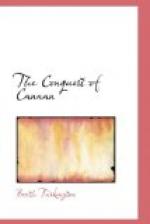Under the summer hat her very dark hair swept back over her temples with something near trimness in the extent to which it was withheld from being fluffy. It may be that this approach to trimness, which was, after all, only a sort of coquetry with trimness, is the true key to the mystery of the vision of the lady who appeared to Joe. Let us say that she suppressed everything that went beyond grace; that the hint of floridity was abhorrent to her. “Trim” is as clumsy as “slender”; she had escaped from the trimness of girlhood as wholly as she had gone through its coltishness. “Exquisite.” Let us go back to Joe’s own blurred first thought of her and be content with that!
She was to pass him—so he thought—and as she drew nearer, his breath came faster.
“Remember! Across main street bridge at noon!” Was this the fay of whom the voice had warned him? With that, there befell him the mystery of last night. He did not remember, but it was as if he lived again, dimly, the highest hour of happiness in a life a thousand years ago; perfume and music, roses, nightingales and plucked harp-strings. Yes; something wonderful was happening to him.
She had stopped directly in front of him; stopped and stood looking at him with her clear eyes. He did not lift his own to hers; he had long experience of the averted gaze of women; but it was not only that; a great shyness beset him. He had risen and removed his hat, trying (ineffectually) not to clear his throat; his every-day sense urging upon him that she was a stranger in Canaan who had lost her way—the preposterousness of any one’s losing the way in Canaan not just now appealing to his every—day sense.
“Can I—can I—” he stammered, blushing miserably, meaning to finish with “direct you,” or “show you the way.”
Then he looked at her again and saw what seemed to him the strangest sight of his life. The lady’s eyes had filled with tears—filled and overfilled. “I’ll sit here on the log with you,” she said. And her voice was the voice which he had heard saying, “Remember! Across main street bridge at noon!”
“What!” he gasped.
“You don’t need to dust it!” she went on, tremulously. And even then he did not know who she was.
XI
WHEN HALF-GODS GO
There was a silence, for if the dazzled young man could have spoken at all, He could have found nothing to say; and, perhaps, the lady would not trust her own voice just then. His eyes had fallen again; he was too dazed, and, in truth, too panic-stricken, now, to look at her, though if he had been quite sure that she was part of a wonderful dream he might have dared. She was seated beside him, and had handed him her parasol in a little way which seemed to imply




